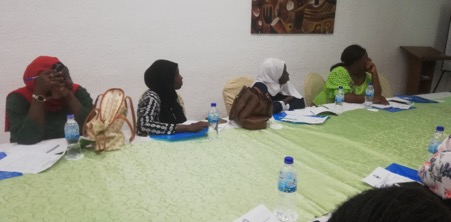
TIPs is a grave human right violation and has severe consequences for the physical, psychological and Social wellbeing of its vistims. Millions of people primarily women and children are trafficked annually for various purposes including forced labour and sexual exploitation.
Moreover, part of the role of shelter staff is to provide support to the residents of the shelter, help maintain order in the shelter and to help residents achieve sucess in transitioning to a better state of living.
Welcoming the gathering,Isatou Dabo, executive director of NAATIP, underscored the importance of thr training, noting that each and everyone has a vital role to play in preventing, protecting victims of trafficking in persons.
"It is well understood that the shelter provides service for vulnerable adults and other individuals that may need shelter. However, victims of trafficking in persons more often than not are also housed at the shelter in which you operate."
Dabo thus reminded participants about the dynamics of TIPs, saying there is a requirement that victims of trafficking are treated in a particular manner based on the trauma, experience they've gone through and so many other things.
She, therefore, indicated that the care that is required and quality of service for victims of TIPs needs to be tailored made.
"In the sense that you may see a victim as a victim, but there are many issues that need to be given the required attention."
She made reference to the fact that that two people may be victims of trafficking, but the trauma and experience of one may not necessarily be the same with regard to the trauma and experience of another.
" The nationality of one may not be the same as the nationality of the other and this would affect their choice of food, ways of dealing with situation and even experience and pain they go through etc. "
She informed that the training will be part one of series of trainings intended for shelter staff and that all the subsequent trainings would be centred on how collectively they can improve services provided by shelter staff.
The day's training was characterised with various presentations on the overview of NAATIP, victim centred approaches so as to improve services provided by shelters, and key concepts of TIPs, among a host other areas.
Read Other Articles In National News





